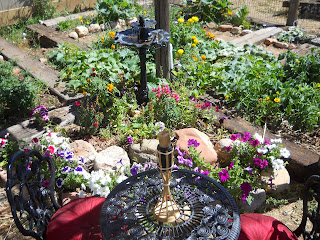In describing his lifelong achievement in writing, Jack Kerouac wrote, "My work comprises one vast book like Proust's except that my remembrances are written on the run instead of afterwards in a sick bed" (Introduction to Big Sur).
 |
| Life and Death happening between blog posts. Our second local wilfire this season. |
Having less than a dozen published poems to my name and nothing else in print, it may seem a bit presumptuous to compare myself to Kerouac, but when it comes to writing, pompous I am, pompous I be, and pompous I do. Anyone who knows me, knows that out of necessity I have plenty of humility in other arenas in my life. Writing is my one and only claim to greatness, which I'll cling to, even after I die.
 |
| Driven by strong winds, the fire quickly spread to the northwest. |
However, I only compare myself to Kerouac because of process. Writers write. Quality and rank is determined after death, sometimes hundreds of years after death. And my affinity with Kerouac is probably also my greatest weakness. I had a professor once tell me, "Everything you write is about yourself; as good as you are, you need break out of the box and write beyond your own insignificance." He then proceeded to steer me to a novel project that went nowhere. It could only go nowhere because it wasn't about me. And like Kerouac, I only write I. In younger years, that seemed to work well. Ann Charters writes that Kerouac was "more committed to the act of creating literature out of his life than he was to living it." Even encumbered with shyness, I lived a Kerouac-like life, which although not necessarily good for the soul, none-the-less was great for the page. In El Paso, I truly was a Dharma Bum. Only the void I entered was null, a face-to-face encounter with death without the release of Nirvana.
 |
| Wildfire is the new reality of the West. Our forests will not be able to recover at the rate they are burning. |
And so I went home. There was nothing else to do, but start over. This time, I decided that I would be more committed to the act of living life and less committed to creating a literature out of it. I developed a plan to overcome shyness, went back to college, met Marci, who saved me, got my degree, as well as a real career, teaching, which I loved so much that for five years I didn't even write. Then, slowly, I found a couple of projects that sort of worked for my new life. The first was a project suggested by my brother, who is an artist. Nevada's Highway 50 has always had special significance to us, as it was the road of our youth and connected our two homes--our mother's home in rural Utah and our father's home in Reno, Nevada. We would write an illustrated book together, Highway 50: Loneliest Road in America to premier at his art show of the same name.
He was diligent. So was I, at least for a couple of years. I wrote frequently in a new format I discovered, which wove together current journal-writing with remembrances of the five-day trip we took together across Nevada's U.S. 50 to kick off the project. I was even lucky enough to find an audience at Dine College's monthly Night at the Library. Having an actual audience encouraged me to keep writing.
But then something happened. We moved. My format fell apart. Like this blog-post, the expository explanations of the life-transition killed the text for me. What made the writing sing--that is was remembrances "written on the run" also killed it. Some of the leaps we must make in life are significant enough that the text refuses to follow. The only way to go back and bridge the gaps is with summary, the deadest of all forms of writing.
Recently, I started a novel that weaves together a fictional story of a literature professor discovering the streets and rails of Chicago with a fictionalized true-account of living in my in-laws basement in Page, Arizona and actual journal writing. But, again, I fear it may suffer the same fate of Highway 50 now that we've moved to Dry Creek. I hope not, because it feels publishable.
But if it can't make the leap, that's okay. I think I have finally found my venue. The blog. What format could be better for literature "written on the run"? As, I've shown here, you can even record two stories at once--the text narrative and the pictorial narrative--which don't even have to line up. Blogging truly is versatile.
 |
| I hope this trucker is either a blogger or vlogger. How many wildfires are unfortunately now part of his runs? |
Can I make a living blogging my life? Can I become a known writer via the blog? Who knows. I don't even care. Here's what I've finally learned. Live life by a plan. Write on impulse. Never confuse the two. And don't let one rule over the other. You don't have to starve to keep your art alive, but you do have to stay slightly hungry. If there's no reaching, there's no art. And for the artist, if there's no art, there's no life. We slowly die without that irrational impulse to record life on the run and share it with some unknown audience out there--real or imagined. That's what drove Chaucer, that's what drove Kerouac, and it's what drives contemporary bloggers, like myself. So, to steal from Jack, I hope you continue to enjoy "the world of raging action and folly and also gentle sweetness seen through the keyhole of [my] eye" because I'm driven to share that view with you whether you like it or not.













